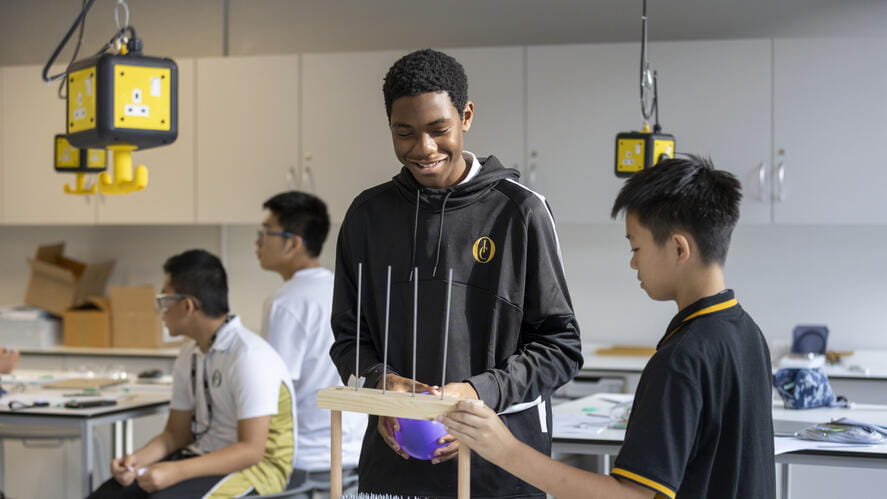We use cookies to improve your online experiences. To learn more and choose your cookies options, please refer to our cookie policy.

Our students have access to an extraordinary amount of information. This, of course, brings many educational benefits. But it also poses some unique challenges.
For our young people, being able to discern the validity of what they read, hear, see, and share is increasingly difficult. And this is why the ability to think critically is more important than ever.
So, how do we at OIC Brighton help our students to become ‘critical thinkers’? And what are the benefits – both in and beyond the classroom – of critical thinking?
Critical thinking is the art of making clear, reasoned judgements by interpreting and understanding information.
It’s a fundamental skill that goes beyond the simple acceptance of information. Critical thinkers have a desire to delve deeper, question assumptions, and explore different perspectives to arrive at well-informed conclusions.
The ability to think critically is essential to success in school, work, relationships, and life in general. Questioning, analysing, and synthesising what we see and hear enables us to solve problems and form our own opinions.
Imagine, for a moment, if we accepted everything we read and heard as fact. What might happen? We might accept misinformation as truth. We would be susceptible to manipulation. And we would struggle to come up with new ways of doing things.
Critical thinking, therefore, helps us to make decisions and navigate the maelstrom of information we encounter every day.
When it comes to academics, critical thinking skills are important in all subjects and disciplines – whether that’s science and engineering or the arts and humanities.
In the classroom, being a ‘critical’ thinker means many things. It’s assessing the validity of sources and making reasoned conclusions. It’s evaluating what’s being taught to form an argument or position. And it’s deciding whether a particular piece of evidence is robust or not.
There are countless advantages to being a critical thinker. We’ve listed some of the benefits below.
Critical thinkers tend to make better choices. They’re experts at understanding and dealing with everyday problems, developing thought processes that can become subconscious. Critical thinkers also excel at weighing pros and cons, considering alternatives, and anticipating potential consequences.
Critical thinkers actively seek out diverse sources of information, which ensures they have a comprehensive understanding of complex issues. This gives them the confidence to engage in meaningful discussions and contribute constructively to their communities.
Critical thinkers are curious about everything. They also tend to have a wide range of interests. Critical thinking means asking questions and wanting to know the why, what, who, where, and how. This helps them to make sense of a situation or concept, and ensures they never take anything at face value.
In a world filled with misinformation, critical thinkers are well-equipped to discern fact from fiction. They scrutinise sources, verify information, and avoid being misled by fake or biased content, particularly online.
Critical thinking encourages innovative, out-of-the-box problem-solving. By considering multiple angles and challenging conventional ideas, critical thinkers arrive at inventive solutions to complex challenges. They’re patient and committed to finding workable solutions, too.
By fostering a habit of introspection, critical thinkers become more self-aware. This helps them to recognise their own biases and limitations. This heightened self-awareness allows them to continually improve and adapt their thinking patterns.
When we think critically, we think on our own and we trust ourselves more. Critical thinking is key to creating independence and encouraging students to make their own decisions.
One of the fundamental aims of our GCSE and A-level programmes is to develop critical thinkers who can solve problems, form considered opinions, and articulate their views clearly.
Our teachers use a variety of methods to help our learners refine these skills. They also offer a range of opportunities for them to apply critical thinking skills in practice.
Meaningful conversations give our students the chance to explore a variety of viewpoints. We encourage active participation and constructive criticism. By engaging in intellectual discourse, our learners refine their critical thinking skills while honing their ability to articulate their position.
One of the fundamental pillars of critical thinking is curiosity. We encourage our students to ask questions and challenge assumptions in a safe and supportive environment. By nurturing their inquisitive nature, we stimulate critical thinking and empower learners to take different perspectives on board.
At GCSE and A-level, lessons are packed with problem-solving activities that foster our students’ critical thinking skills. Our learners also engage with real-world scenarios that require analysis, synthesis, and decision-making. These activities include case studies, group projects, and hands-on experiences.
Our students develop their thought processes through regular reflection and review. Evaluating what went right and/or wrong helps them to make great progress, too. Self-assessments and group discussions, for example, facilitate this process.
Creativity and critical thinking go hand-in-hand. One of the ways we inspire our students to think creatively is through open-ended tasks and projects. These require them to think outside the box, come up with innovative solutions, and analyse potential risks and benefits.
In answer to our own question, ‘yes’, we think so!
Critical thinking is, without doubt, one of the most important 21st century skills our students can master. It helps them to better understand and interact with the world around them, to develop their knowledge, and to manage the growing challenges posed by misinformation.
Critical thinking is universal, too – it’s a skill that will always be relevant, no matter what path, university degree, or profession a student pursues.
To find out more about the importance of critical thinking at OIC Brighton, please get in touch with us.